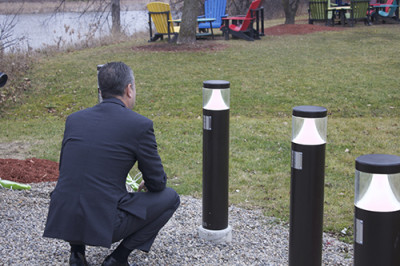Remembrance Through Roses
STORY BY MARK ELGIE
THINGLINK BY MICHAEL MELRO
Sunday, Dec. 6 marked the anniversary of the Ecole Polytechnique Massacre.
It was 26 years ago that Marc Lepine entered the institution armed with a rifle and a hunting knife, and killed 14 women.
“I think for a lot of students who come to Sheridan today, they weren’t alive at that time. They had yet to be born. But I have very strong, vivid memories of that occasion,” said Sheridan President Jeff Zabudsky.
Zabudsky remembers being shocked by what he saw on television as he walked into his apartment after a day at work. “There was a great shock right across the nation at the time. And then as the information started to emerge that it wasn’t random, it was a planned attack on women, it struck deeply into the heart of most Canadians, well, every Canadian,” said Zabudsky.

Sheridan President Jeff Zabudsky, paying his respects to one of the victims of the Ecole Polytechnique Massacre. Photo taken by Mike Melro.
For a number of years, Sheridan has held a National Day of Remembrance and Action on Violence Against Women ceremony to memorialize the event. The event was held at Davis this year on Friday, Dec. 4, with the event last year being held at the Trafalgar campus.
“We have a peace garden on both the Trafalgar and the Davis campus, so we alternate the main ceremony at each of those two campuses,” said conference and event services coordinator Shelley Barr. “So we have students, faculty, and staff that attend and it’s really only a 20 minute ceremony.”
The ceremony consisted of a couple speeches from Zabudsky, roses being laid out at the base of each victim’s picture, as well as laying roses down at Davis’ peace garden, located outside the cafeteria.
In committing the act that took the lives of these women, Lepine claimed he was combating feminism. “The early feminist leaders really have led the way in the kinds of freedoms that women have today, and that person’s attack on feminism was an attack on that progress,” said Zabudsky. “I have strong feelings that we need to honor those leaders, those women who were seen as the early feminists, that got women the vote, that addressed issues of women being able to work. They need to be honored.”
Regardless, Zabudsky said that the fight is not over. “It demonstrates that to this day, the need for feminist influences, public policy around building up women, there’s still work to be done. We honor those early feminists and the principles of feminism by continuing the work that they started, and there’s still much work to be done.”
Here are some facts about violence against women.





